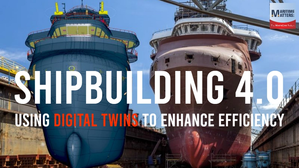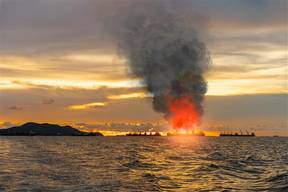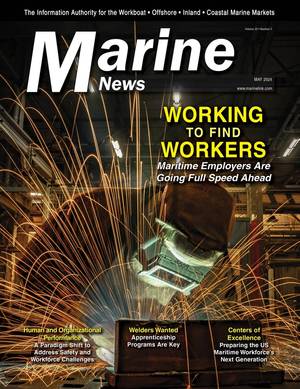Pod Propulsion
Pods are devices which combine both propulsive and steering functions in one device. They are usually located below the stern of a ship, making use of the following internal components: a fix pitch propeller, shaft, thrust and support bearings, brake, and shaft seals; exciter; AC motor (synchronous); bilge pump; and appropriate monitoring and control equipment. The steering unit uses slewing gears and is located in the hull above the pod itself. Lubrication equipment and ventilation/cooling units are usually located externally, as sub systems. Propulsion pods are not a new product, but a new configuration of traditional marine systems and components.
As yet, studies have not shown whether pods are more efficient than conventional shaft lines. There has been much research on the subject, but most studies have been aimed at a specific aspect of pod performance instead of an overall efficiency review. Several advantages have been attributed to pod propulsion systems, such as: reduced emissions, lower noise and vibration levels and emissions; improved steering maneuvering, and braking capabilities. The reduced number of component parts also allows for more flexibility in arranging system machinery, more efficient construction and improved shipyard logistics. On the opposite end of the argument, pods require a greater capital investment, have a 30MW power limitation (per screw), and have been known to suffer losses in power due to electric propulsion.

ZF Marine Debuts 4600 POD Propulsion System
Marine driveline specialist ZF announced it will premier its new 4600 POD Propulsion…

Superyacht ARTEFACT: A real “arte factum”
NOBISKRUG’s Project 790 is one of the first yachts built under the new strict IMO…

Shipbuilding: Inland Towing Thunderstruck
Eastern Shipbuilding offers the 4,200 hp Thunderbolt inland towboat designed around…

Thunderbolt: Eastern Delivers Innovative Towboat
Eastern Shipbuilding Group, Inc. introduced its new 120-ft., 4,200-hp Inland Towboat design…
Eastern Debuts ‘Thunderbolt’ Towboat
Eastern Shipbuilding Group, Inc. introduced its new 120-foot, 4,200-horsepower Inland…

Azipods Earn US$180-Million for ABB in 2013
Pod propulsion system Azipod® was the propulsion system of choice for 6 new cruise liners in 2013…

Caterpillar Set to Showcase New Pod Propulsion Engine
Caterpillar Marine say they will unveil a significant product milestone at the 2013…

ZF Marine’s New Single POD Propulsion System
ZF Marine LLC, the North American division of the global ZF Marine Group, introduced…

Air Supported Monohull with Pod Propulsion
Effect Ships International AS, Sandefjord, Norway has just launched their first Air…
Royal Caribbean, Rolls-Royce Pod Settlement
Royal Caribbean Cruises Ltd. (NYSE, OSE: RCL) and Rolls-Royce announced that they…
STX Europe, New Order from French Navy
STX Europe has, through its subsidiary STX France Cruise SA, signed a contract to…
Siemens Equips Ships for Australia's Navy
Siemens Marine Solutions has been commissioned by the Spanish shipyard Navantia S.A.
Contracts between vessel owners and charterers concerning the water transportation of goods are technically known in admiralty law as "contracts of affreightment". The charterer agrees to pay a freight charge for cargo space. The voyage, amount of cargo space…
A port authority operates ports and other transportation infrastructure for a special-purpose district. Whether operated directly by the government or in cooperation with government agencies, North American port authorities are public entities and are governed by a board or commission.
A winch is a mechanism used to reel in, to let out, or otherwise adjust the tension of a rope, wire, or cable. Boats and ships make use of multiple winches to handle halyards, sheets, as well as anchor or mooring lines. The basic mechanism consists…
All ships need maintenance and repairs. Many repair and maintanance operations can be performed at sea or by the crew in port. Complicated or large-scale repairs might require the ship to be removed from commercial operation. Classification…














